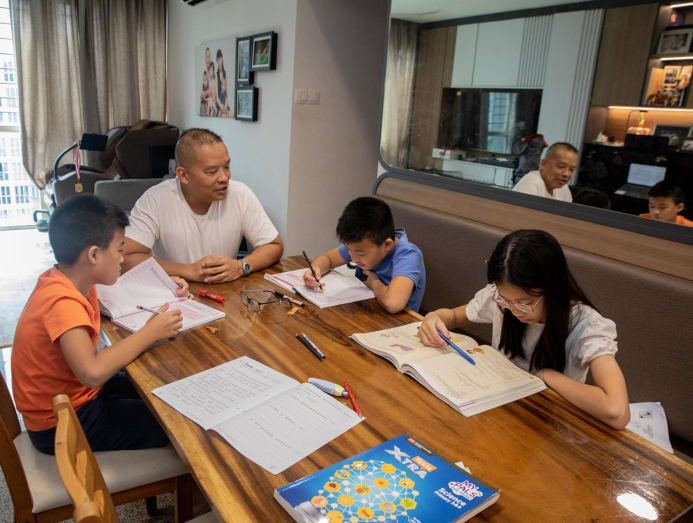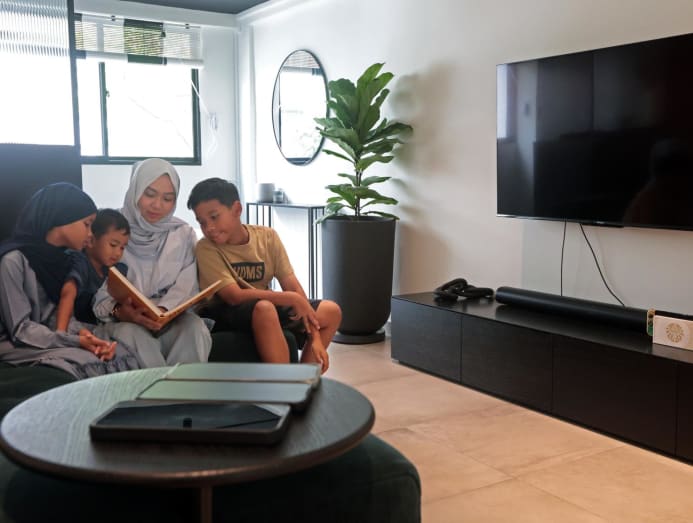'No choice but to allow it': Parents cite challenges in keeping devices away from kids amid concerns over excessive screen time

SINGAPORE — Before having children, Ms Lily Khairunnisa and her husband had a vision of raising their future children in a completely "screen-free" environment, knowing well the potential harmful effects it could one day bring.
But just two years after their first son was born, they came to realise that it was impossible to keep screens away from him, eventually turning to television as a tool to help keep him occupied.
They now have three kids aged four, 10 and 11, with the latter two just receiving their own mobile phones a month ago.
“We need that precious break to keep them quiet so we can do other things like prepping for an outing or even just going to the loo,” said 36-year-old Ms Lily, an investment business owner.
“These pockets of breaks help keep us sane.”
Last weekend, Deputy Prime Minister Lawrence Wong said that the Government would consider additional safeguards around excessive screen time and social media use for children, to protect the mental health of young people.
He was speaking at a 55th anniversary event of suicide prevention centre Samaritans of Singapore.
Mr Wong, a patron of the organisation, announced the plan amid an increase in mental health concerns among the younger generation worldwide.
“Screen time during infancy adversely affects development of cognitive skills needed for self-regulation and learning, as well as socio-emotional competence as the child grows up. This in turn raises the risk of mental conditions, such as depression,” he said in his speech.
TODAY spoke to eight parents who shared their views and challenges in limiting their children’s use of digital devices. While all agreed that too much screen time is bad for their children, some struggle to cap their usage.
WHY DO PARENTS STILL GIVE KIDS SCREEN TIME WHEN IT’S BAD?
Like Ms Lily, Mr Derrick Yuen and his wife let their daughter watch nursery rhyme videos while Mrs Yuen does household chores.
The 51-year-old data consultant said that it was more about setting a clear, practical rule from the beginning — that screen time is only for whenever it is necessary, but not avoiding it entirely.
He limits the use of electronic devices only for school-related activities and does not allow his three children to be on social media.
“My wife and I wanted our children to have less screen time, not no screen time — given the state of our world today, it would be difficult and impractical,” said Mr Yuen.

Agreeing, Ms Christine Mah, a workspace services manager, said that the moving images and music in videos have helped her then two-year-old daughter to learn nursery rhymes better.
“When faced with the various needs of the child and the grandparents who helped raise her, we had to adapt to the changing situations and environment, and to strike a balance between limiting (device) use and meaningful exposure,” she said.
For 40-year-old Archita Biswas, it felt like she had “no choice” but to allow her daughter, when she was one year old, to have screen time to ensure she eats. Her daughter is 13 now.
Ms Archita said: “She was never a co-operative eater, so the Disney Junior channel was our saviour. When we switched on the television, at least we were able to feed her a few spoons.”
Together with her husband, Mr Vedha Giri, they gradually engaged in “friendly discussions” that do not “sound like a lecture” with their daughter on the health effects of excessive screen time.
Ms Lily said that limiting her children’s screen time came with challenges.
“My parents and siblings would sometimes offer their phones to my kids even though I've told them that I do not want screen time for them. I would usually just close one eye in these situations.”
She added that due to excessive screen times, her children would sometimes throw unnecessary tantrums and show a lack of social awareness, such as not responding to others who call for them.

WHAT CAN THE GOVERNMENT DO?
Like the rest of the parents interviewed, 50-year-old IT project manager and father of three Maheswaran Subramaniam supports the idea of having additional safeguards on excessive screen time, but he believes that parents still play an important role.
Fellow IT professional Ghazali Maricar, 53, agreed that “everyone can support a common cause” if safeguards are publicly available, instead of just parents taking it upon themselves.
Family life educator and consultant Esther Foong-Tan, 39, suggested looking into equipping and resourcing parents with alternative ways to engage children aged four and below.
“Residents' committees or community centres can organise age-appropriate activities in the neighbourhood for parents to easily bring their children for hours of fun, or forming wholesome and positive parent communities that can share resources and ideas,” said Ms Foong-Tan, who also co-founded parents support group SGFamilies.
“These can help to free up time for parent-child interactions, as well as manage the stress of parenting.”
Ms Siti Raudah, a 39-year-old teacher and mother of two daughters aged three and five, said that children need to be exposed to more play-based interactions with peers of the same age, be it in school or at home.
“Game advertisements on YouTube should also be minimised so that their attention will not be diverted to wanting to download these apps,” she added.
Mr Yuen raised concerns on the use of electronic devices as learning tools in schools at a young age.
“As it stands, I feel that MOE's (Ministry of Education) plan to expose children to mobile devices and the internet in primary school is too early as they are not mature enough and lack self-regulation, especially the boys,” said Mr Yuen.
Echoing this sentiment, Ms Archita said: “While the safeguards are good, I feel the Government should also stop the usage of learning devices like iPads and Chromebooks in schools as children are using them for a prolonged period, and it is affecting their eye health. They are also diverted to websites that have no links to schoolwork.”

WHAT EXPERTS SAY
Ms Melissa Goh, a senior lecturer of the early childhood education programme at the Singapore University of Social Sciences, said that studies have shown links between media use for children under two years old and developmental issues like delays in learning languages.
Screen time or screen-based learning offers a more passive experience of learning that limits benefits across cognitive, social, emotional and physical domains, she added.
“I would recommend that parents limit the duration and filter the type of media that the child watches by opting for educational shows that are age-appropriate and depict real-life experiences and scenes.”
She also proposed counter measures such as having breaks and ensuring that the child has a decent amount of time outdoors and playing with toys or physical objects.
Dr Jason Gan, a lecturer in the same programme, said that the Government should engage parents and caregivers and raise their awareness on the issue.
“They should specifically address gaps in understanding the implications of excessive screen time and educate parents on utilising 'parental controls' within digital devices.”
He also proposed having a national movement such as a "no screen hour", which can be an effective way of raising awareness and promoting reduced screen time.






